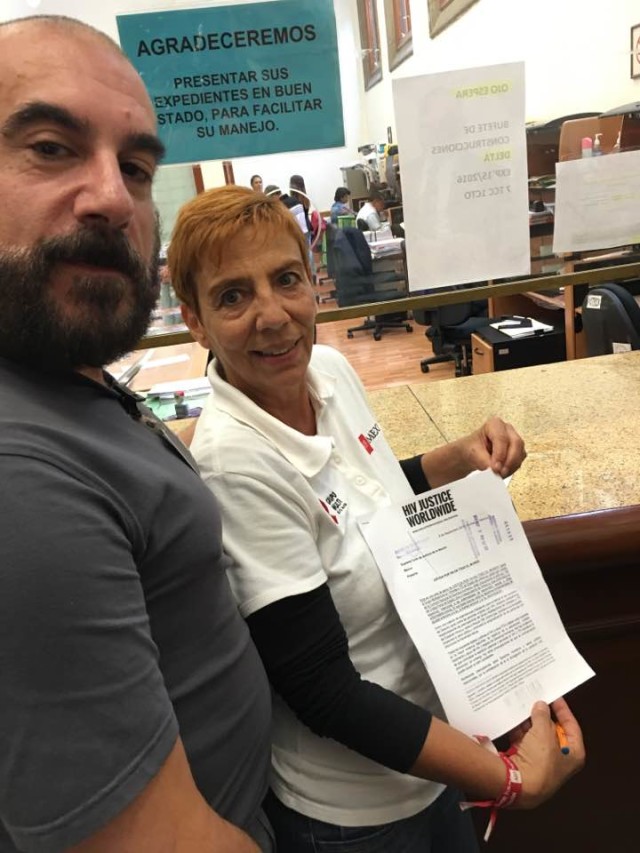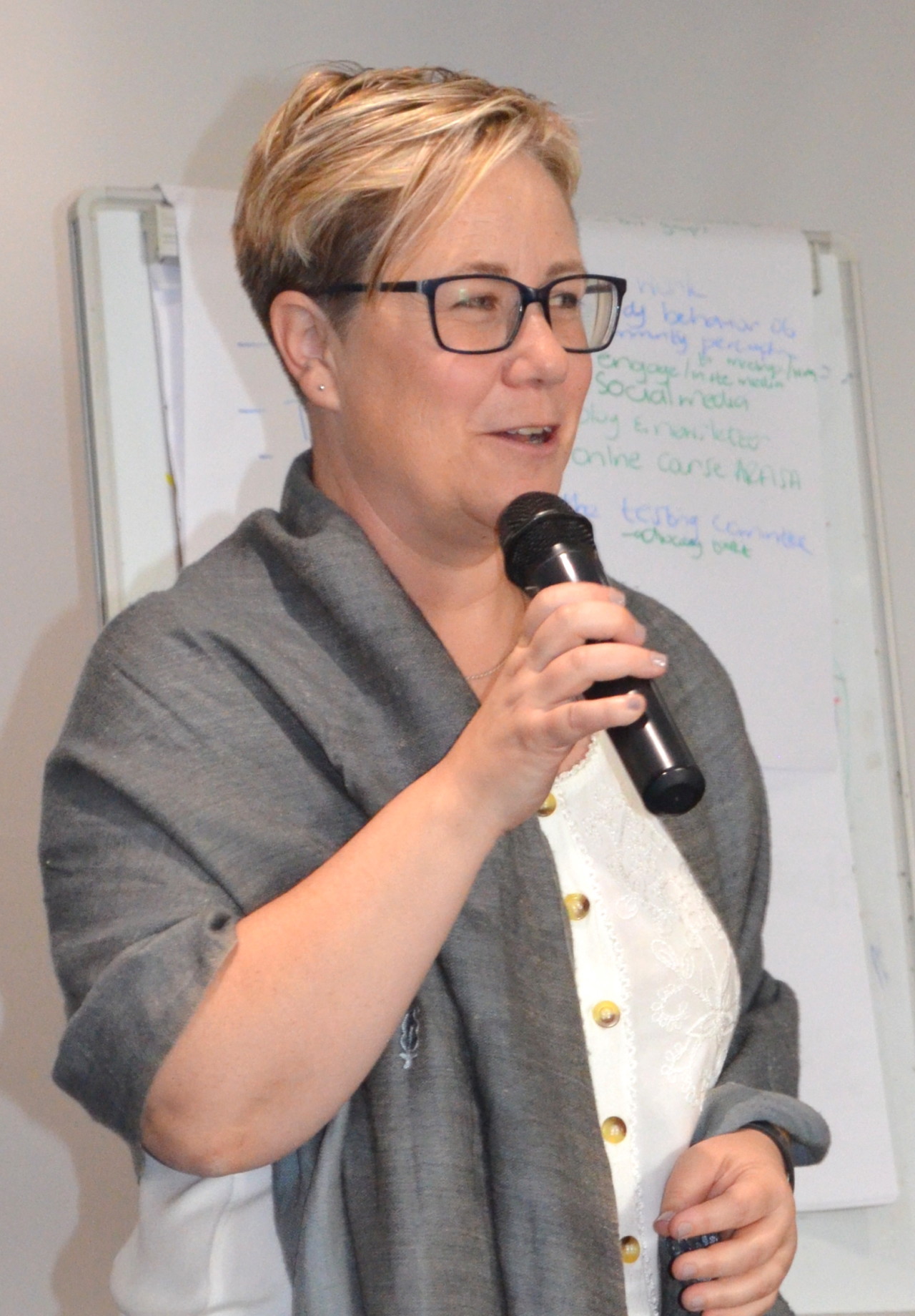In Canada, not disclosing your HIV status to a sex partner can, in some circumstances, be deemed a crime. Media stories of people prosecuted for not disclosing their status show black men on trial in disproportionate numbers. What impact does this have on African, Caribbean and black communities?
“In a word, it’s dehumanizing.” Robert Bardston is talking about media coverage of HIV non-disclosure cases. I’ve spent the past couple of months engaged in a series of poignant, inspiring and sometimes-heartbreaking conversations about the criminalization of HIV non-disclosure. I am trying to understand how mainstream media stories on the issue impact African, Caribbean and black (ACB) people across the country. Robert and I are speaking on the phone — miles stretch between his Medicine Hat and my Toronto. It’s early and the sleep is still working its way out of his voice.
He lets out a weighty sigh and continues: “It’s dehumanizing to see yourself branded as deviant in the public eye, especially through the media.” Robert, an HIV activist and co-chair of the Canadian HIV/AIDS Black, African and Caribbean Network (CHABAC), has lived with the virus since 1988.
In an illuminating conversation, we explore what it feels like to see and hear stories of people criminalized for not disclosing their HIV status before sex. We cycle through the emotional toll the coverage can take and the complicated feelings it evokes. Robert says that people living with HIV are treated as pariahs and that black people living with HIV face both HIV stigma and debilitating racism in how their stories are told.
Throughout our conversation he juxtaposes two key elements of his identity — his status as a person living with HIV and his identity as a black person in Canada. As Robert points out, African, Caribbean and black people living with HIV have pressing and unique concerns regarding the criminalization of HIV non-disclosure. To fully understand how deeply this issue impacts individuals and communities, we must first understand what it means to inhabit both of these spaces. To understand this moment in time, we must look at it in context.
The first cases of people being charged for not disclosing their HIV status to sex partners date back to the late 1980s. Since 1989, more than 180 HIV-positive people have been prosecuted in Canada for not disclosing their status. A sharp rise in the number of cases, which began in 2004, has been accompanied by increasing severity in the type of criminal charges laid at the feet of people living with HIV.
Today, someone facing prosecution typically faces an aggravated sexual assault charge — a serious criminal charge with potentially grave consequences. If convicted, a person can be added to the sex-offenders registry and face a sentence of up to life in prison. In cases where the accused has immigrated to Canada, they may also face deportation.
In all of my conversations, the year 2012 pops up as a recurring focal point. That year the Supreme Court of Canada released decisions on two highly anticipated cases. The Court had been asked to clarify the conditions under which people living with HIV could face criminal prosecution for not disclosing their HIV status to sex partners. Legal obligations to disclose one’s status had already been in effect since the late ’80s, but in 2012 the court was asked to determine how using a condom or having a low viral load could impact criminal liability in cases of HIV non-disclosure.
By 2012 the global HIV epidemic was entering its third decade. Tremendous gains had been made in better understanding the biology of HIV transmission and advocates hoped that the highest court in Canada would seize this opportunity to integrate the latest scientific evidence on HIV transmission risks — showing that condoms and maintaining a low viral load significantly cut the risk — into legal processes. In a 1998 decision the Court had ruled that people living with HIV had a legal duty to disclose their status before having sex that might pose a “significant risk” of transmission. The court’s definition of “significant risk,” however, was vague and unclear, and advocates hoped that the 2012 ruling would bring greater clarity to the law.
Instead, the law became stricter. People living with HIV were now required to disclose their status before sex that posed a “realistic possibility” of HIV transmission. The problem was that sex posing a realistic possibility included situations where there is effectively zero risk. Critics called the decision a step back that diminished the rights of people living with HIV.
While the cases were being deliberated in the highest court in the land, they were also being dissected in the court of public opinion. One case involved a black man accused of failing to disclose his HIV-positive status to several sex partners. Although HIV was never transmitted to any of his partners, he was charged with six counts of aggravated sexual assault.
By the time the Supreme Court issued its landmark ruling, dangerous and harmful ways of talking about HIV and, in particular, African, Caribbean and black men living with HIV had become the norm. Some of the most discussed cases of that period involved black men; the result was a disturbing fusion of blackness and criminal deviance.
Looking back, people living with HIV and advocates describe popular coverage of criminalization cases during that era as uniformly poor, increasing stigma and undermining education and knowledge about the science of HIV. The coverage not only normalized language that framed people living with HIV as inherently deceptive and dangerous to the public, the disproportionate focus on people of African, Caribbean and black descent, particularly straight black men, told a singular, dangerous story.
The fusion of black identity and negative stereotypes is not new. Indeed, it is something black people and communities contend with daily. In another illuminating conversation, Shannon Ryan, the executive director of Black CAP (Black Coalition for AIDS Prevention), who has worked in HIV organizations for two decades, tells me, “Being black in Canada means something. Systemically and institutionally, it means something — whether you stepped off a plane this morning or your family has been here since the 1700s. I try to remind the people I work with that our blackness is something to celebrate and includes strength and solidarity. But in the world outside these doors, being black can also include facing anti-black racism, it means marginalization, it means oppression and vulnerability.” Contemporary narratives about the criminalization of black people who don’t disclose their HIV status draw from and feed into these problematic and stifling conceptions.
Equally stifling is the criminalization that black communities must contend with in the first place. Black people are vastly over-represented in Canada’s prisons. A 2015 report from the Office of the Correctional Investigator found that the federal incarceration rate for African, Caribbean and black people in Canada is three times their representation rate in the general population.
“The criminalization of HIV non-disclosure is another way our communities are being criminalized and torn apart,” says Ciann Wilson, an assistant professor at Wilfred Laurier University who has worked with African, Caribbean, black and Indigenous communities responding to HIV. “HIV follows lines of existing inequity and the criminalization of people living with HIV further disenfranchises communities that are already dealing with structural racism.”
There’s an old adage that we understand the world around us by the stories we tell about it. A team of Ontario researchers analyzed 1,680 Canadian newspaper articles about HIV non-disclosure criminalization cases that were published between 1989 and 2015. They found that 62 percent of the stories focused on cases involving black immigrant defendants, yet only 20 percent of the 181 people charged during the same period were African, Caribbean or black men. The research team concluded that the media disproportionately focuses on cases involving black people facing prosecution for non-disclosure.
“There’s no question about it: Straight black men in particular are over-represented in the media coverage of these cases,” says sociologist Eric Mykhalovskiy, one member of the research team. “If you take a closer look at the coverage, half of the 1,680 articles focused on four black men facing prosecution. The fact that the coverage is so skewed toward those defendants really produces in the public imagination the idea that HIV non-disclosure is a crime of black heterosexual men — when it’s not,” he says. “It’s a profound example of what is clearly a long history of over-representing black people in crime stories in the media.” [To read the full report, Callous, Cold and Deliberately Duplicitous: Racialization, Immigration and the Representation of HIV Criminalization in Canadian Mainstream Newspapers, click here.]
The storytelling pattern Mykhalovskiy references traces back to some of the first HIV non-disclosure cases involving African, Caribbean and black men in Canada. Early media reports drew from racialized stereotypes about black men, masculinity and gender. They conjured images of hyper-sexualized black men maliciously transmitting HIV to unsuspecting partners — usually white and female. News headlines frequently described defendants as “predators” while making reference to “potent” African strains of HIV.
The same patterns emerge in contemporary mainstream coverage of HIV non-disclosure cases involving ACB individuals. “Many people may not personally know someone who is HIV positive. They know about HIV through the media,” Mykhalovskiy says. “When you look at the stories that are told, you see that the kind of knowledge that’s available paints black people living with HIV as a significant threat and danger. It’s really concerning.”
The effects are far reaching. HIV is a pressing concern for many African, Caribbean and black communities across the country and these problematic narratives impact the ways in which communities and individuals experience and respond to HIV.
Take, for example, Linda, who has had HIV since 2003. She currently lives in B.C., where she’s been working with groups supporting black people living with HIV in that province. Linda is a force to reckon with. She is a quiet revolution who resists the oversimplification of the lives of people living with HIV. Yet it’s impossible to miss the fatigue that clouds her voice when she talks about the impact of HIV non-disclosure media stories on the lives of people with HIV.
“The ways they talk about us in the media — it makes you feel worthless. It’s a huge problem for us African people living with HIV. We talk amongst ourselves and we are scared.” She continues after a measured pause: “I think it’s cruel. It’s only expanding the stigma. It’s pushing people away instead of encouraging people with HIV to come forward and talk about stigma.”
Increasing stigma and isolation are top concerns for service providers at HIV organizations, too. These organizations work to disrupt the problematic stories told in the popular press about HIV and the criminalization of non-disclosure. They have been working diligently to shift the conversation and advocate for laws that don’t further marginalize people living with HIV. They argue that stigma is a major barrier in effective responses to HIV.
Two such organizations — Black CAP and the African and Caribbean Council on HIV/AIDS in Ontario (ACCHO) — are located in an inconspicuous office building in downtown Toronto. I’m delivered to the fourth floor of the building by a shaky elevator reminiscent of an earlier time. Stepping into the waiting area I am aware of the unique place in the Canadian conscience and HIV service organization landscape held by agencies like Black CAP and ACCHO.
African, Caribbean and black people make up less than 3 percent of Canada’s population, yet they account for 14 percent of HIV infections. Here again, African, Caribbean and black communities are over-represented and disproportionately impacted. Despite these telling demographics, organizations like Black CAP and ACCHO, which both work specifically with and for ACB communities, are few, far between and often crippled by limited funding.
The situation creates a paradox — one where ACB communities are over-represented among people living with HIV and where the public imagination creates strong links between blackness and HIV — yet interventions that cater specifically to ACB communities are limited. HIV in ACB communities is simultaneously hyper-visible and erased in the same breath.
ACCHO director Valérie Pierre-Pierre begins our conversation by reflecting on the coverage of HIV criminalization cases. “Even though high-profile cases don’t necessarily represent the majority of cases, the media covers those cases in ways that further demonize the accused. They elicit negative reactions toward people living with HIV, especially black men.” She is referring to narratives that frame people living with HIV as maliciously transmitting the virus to unsuspecting partners. She and others in HIV service organizations argue that these portrayals have driven misinformation and stigma — which fuel fear and, in turn, create barriers to addressing HIV in ACB communities.
Black CAP executive director Shannon Ryan, reflecting on the aftermath of the Supreme Court rulings and the media coverage, says, “It does not help us do our work. It does not promote testing. It does not promote diagnosis. It does not promote disclosure. It does not reduce stigma. It diminishes our work.”
While proponents of the current law argue that it helps prevent HIV (that the fear of prosecution will make people living with HIV take precautions with their sex partners), many people living with HIV and many working in the field argue that the criminalization of non-disclosure and the discourses around it become marginalizing forces. In African, Caribbean and black communities, this can have a particularly damaging and splintering effect.
Months after my first call with Robert Bardston and many conversations later, I have talked to people living with HIV, service providers, legal experts and researchers about the impact of HIV non-disclosure criminalization on African, Caribbean and black communities and the stories we tell about it. To be sure, this is a difficult and divisive issue. Yet in the midst of it all, there are extraordinary individuals and groups resisting and challenging harmful narratives about these communities and criminalization.
They are claiming space and demanding this story be told a different way. They want the story to begin with an acknowledgment that structural violence and marginalizing narratives about African, Caribbean and black communities drive increasing rates of HIV and, indeed, criminalization. Many also want to make it clear that the current system does not serve already-vulnerable communities.
Listening to their stories of resistance, I allow myself to start imagining and dreaming about a system that better serves our communities.
For more on the criminalization of HIV non-disclosure, visit the Canadian HIV/AIDS Legal Network‘s website.
Sané Dube is a Zimbabwean transplant to Canada. She lives in Toronto.



